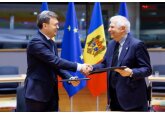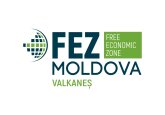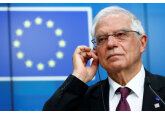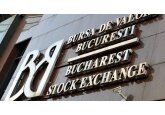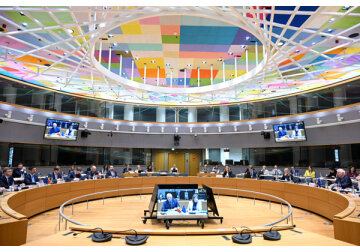
Moldova, with EU support, is developing an Economic Growth Plan that will help implement key economic reforms and investments.
The EU Council said this in a statement following the 8th annual meeting of the EU-Moldova Association Council within the EU-Moldova Association Agreement held in Brussels on 21 May. The Council was chaired by EU High Representative for Foreign Affairs and Security Policy Josep Borrell. The Moldovan delegation was headed by Moldovan Prime Minister Dorin Recean. EU Commissioner for Neighborhood Policy and Enlargement Olivér Várhelyi also participated in the meeting. According to the EU Council, the EU reiterated that the future of Moldova and its people lies in the European Union and reaffirmed its commitment to help Moldova carry out reforms on the way to membership. In particular, the EU commended the Moldovan government's continued commitment to reforms in the rule of law, fight against corruption, democratic institutions, public administration and economy, despite the challenges posed by Russia's war of aggression against Ukraine and hybrid actions against Moldova itself. The Association Council welcomed the historic decision of the European Council of June 23, 2022 on granting Moldova the candidate status and of December 14, 2023 on the opening of talks on Moldova's accession to the EU. The participants in the meeting in Brussels voiced hope that the EU Council will promptly adopt the negotiating framework, after Moldova takes the relevant steps set out in the Commission's recommendations of 8 November 2023, in order to immediately organize the first intergovernmental conference. The Association Council took note of the implementation of the Association Agreement, including the Deep and Comprehensive Free Trade Area (DCFTA). The Council welcomed the adoption and early operationalization of the National Plan for the adoption of the agreement. The EU commended Moldova's tireless efforts to carry out a comprehensive reform of the justice system, emphasizing the importance of establishing an independent, impartial, accountable and professional judiciary in line with European standards and Venice Commission recommendations as an indispensable condition for the EU integration process. In view of the upcoming presidential elections and the referendum on Moldova's path to the European Union, the EU recalled the importance of a transparent, inclusive and competitive electoral process and encouraged Moldova to continue its dialogue with the Venice Commission and the OSCE Office for Democratic Institutions and Human Rights to ensure that measures to counter malicious interference are conducted in line with international standards. Looking ahead, the participants in the meeting emphasized the importance of further deepening the sectoral cooperation with Moldova and its integration into the EU internal market. Structural reforms, such as in the energy sector or in the modernization of the telecommunications, payment and banking systems, would bring tangible benefits of European integration to Moldova and its citizens, they said. Moldova recalled the application to join the Single Euro Payments Area (SEPA) in February 2024 and expressed willingness to take all necessary steps for full membership. The Association Council welcomed the signing of a joint declaration by EU-based and Moldovan telecommunications operators on the voluntary reduction of data and voice roaming charges, as well as Moldova's efforts to further harmonize with EU roaming legislation in order to reduce roaming charges and include Moldova in the EU roaming zone. The Council welcomed Moldova's submission of its first Economic Reform Program in January 2024 and its participation in the Economic and Financial Dialogue, the highest level of EU engagement with third countries on economic issues. The Council also welcomed the EU decision to extend for another year the autonomous trade measures and the Agreement on road freight transport, thus granting Moldova temporary full trade liberalization and liberalization of road freight transport. The Association Council welcomed the launch of the High Level Dialogue on Transport between the EU and Moldova. The EU welcomed Moldova's firm and principled position in condemning Russia's war of aggression against Ukraine and the significant strengthening of its compliance with the positions and restrictive measures of the EU Common Foreign and Security Policy. The EU commended Moldova for its efforts to receive and accommodate people fleeing Russia's war of aggression against Ukraine. The EU also noted Moldova's important contribution to the EU-Ukraine Solidarity Lanes, which facilitate the export and import of essential goods. The EU invited Moldova to continue close cooperation to prevent the circumvention of EU sanctions against Russia and Belarus. It was stressed that the EU and Moldova reaffirmed their close cooperation in the security and defense field and welcomed the signing of the EU-Moldova Security and Defense Partnership on the margins of the Association Council, which brought this cooperation to a new strategic level. The EU strongly condemned the repeated violations of Moldovan airspace by Russian missiles and drones used to attack civilian infrastructure in Ukraine and welcomed Moldova's decisive steps in response to the hybrid actions led by Russia and its proxies. The EU pledged to continue to fully support Moldova's resilience, including through the European Peace Facility and the EU Partnership Mission to Moldova, which has proven its particular value in countering hybrid and cyber threats. The EU reaffirmed its commitment to promote a comprehensive, peaceful and sustainable settlement of the Transdniestrian conflict, based on Moldova's sovereignty and territorial integrity within its internationally recognized borders. The participants welcomed Moldova's association with the EU's Connecting Europe Facility (CEF), Single Market, Digital Europe and Union Civil Protection Mechanism programs since the last meeting of the Association Council. On the margins of the Association Council, the EU and Moldova signed an Association Agreement under the Employment and Social Innovation (EaSI) program of the European Social Fund Plus (ESF+). Moldova expressed interest in strengthening cooperation at local and regional level and proposed the establishment of a Joint Consultative Committee between the European Committee of the Regions and Moldovan local and regional authorities, which could serve as a platform for dialog, cooperation and exchange of best practices. The participants in the meeting discussed the EU's all-round support for Moldova. It was emphasized that since 2021, the EU has been strongly reaffirming its support and solidarity with Moldova by providing up to €2.2 billion in loans and grants. These significant funds are channelled through numerous financial instruments, such as direct budgetary support, macro-financial assistance, EU programs and EU-guaranteed projects with international financial institutions. One of the key priorities has been the implementation of the EU Economic and Investment Plan for the Eastern Partnership in Moldova. It has helped translate policy priorities into real investment projects with high impact on Moldova's economy, communities and citizens. The key sectors where the Economic and Investment Plan has mobilized investments are energy, transport and access to finance for business. The Association Council welcomed the ongoing work in Moldova, supported by the European Commission, on the Economic Growth Plan, which will help implement key economic reforms and investments in the coming years. "Moldova and the EU intend to continue working together to promote Moldova's accession to the EU," the EU Council said in a statement. // 22.05.2024 - InfoMarket.


